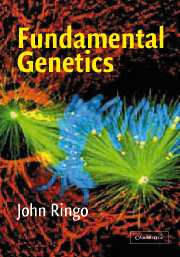Book contents
- Frontmatter
- Contents
- Preface
- Acknowledgments
- Chapter 1 Life Forms and Their Origins
- Chapter 2 Nucleic Acids
- Chapter 3 Proteins
- Chapter 4 Simple Chromosomes
- Chapter 5 Chromosomes of Eukarya
- Chapter 6 Genome Content
- Chapter 7 RNA Synthesis 1: Transcription
- Chapter 8 RNA Synthesis 2: Processing
- Chapter 9 Abundance of RNAs in Bacteria
- Chapter 10 Abundance of RNAs in Eukarya
- Chapter 11 Protein Synthesis
- Chapter 12 DNA Replication
- Chapter 13 Chromosome Replication
- Chapter 14 Molecular Events of Recombination
- Chapter 15 Micromutations
- Chapter 16 Repair of Altered DNA
- Chapter 17 Reproduction of Bacteria
- Chapter 18 Horizontal Gene Transfer in Bacteria
- Chapter 19 Cell Cycles of Eukarya
- Chapter 20 Meiosis
- Chapter 21 Chromosomal Abnormalities
- Chapter 22 Life Cycles of Eukarya
- Chapter 23 Reproduction of Viruses
- Chapter 24 Genetic Processes in Development
- Chapter 25 Sex Determination and Dosage Compensation
- Chapter 26 Cancer
- Chapter 27 Cutting, Sorting, and Copying DNA
- Chapter 28 Genotyping by DNA Analysis
- Chapter 29 Genetically Engineered Organisms
- Chapter 30 Genomics
- Chapter 31 Behavior of Genes and Alleles
- Chapter 32 Probability and Statistics Toolkit
- Chapter 33 Genes, Environment, and Interactions
- Chapter 34 Locating Genes
- Chapter 35 Finding and Detecting Mutations
- Chapter 36 Cytoplasmic Inheritance
- Chapter 37 Genetic Variation in Populations
- Chapter 38 Mutation, Migration, and Genetic Drift
- Chapter 39 Natural Selection
- Chapter 40 Quantitative Genetics
- Chapter 41 Speciation
- Chapter 42 Molecular Evolution and Phylogeny
- Glossary
- Index
Chapter 26 - Cancer
Published online by Cambridge University Press: 05 June 2012
- Frontmatter
- Contents
- Preface
- Acknowledgments
- Chapter 1 Life Forms and Their Origins
- Chapter 2 Nucleic Acids
- Chapter 3 Proteins
- Chapter 4 Simple Chromosomes
- Chapter 5 Chromosomes of Eukarya
- Chapter 6 Genome Content
- Chapter 7 RNA Synthesis 1: Transcription
- Chapter 8 RNA Synthesis 2: Processing
- Chapter 9 Abundance of RNAs in Bacteria
- Chapter 10 Abundance of RNAs in Eukarya
- Chapter 11 Protein Synthesis
- Chapter 12 DNA Replication
- Chapter 13 Chromosome Replication
- Chapter 14 Molecular Events of Recombination
- Chapter 15 Micromutations
- Chapter 16 Repair of Altered DNA
- Chapter 17 Reproduction of Bacteria
- Chapter 18 Horizontal Gene Transfer in Bacteria
- Chapter 19 Cell Cycles of Eukarya
- Chapter 20 Meiosis
- Chapter 21 Chromosomal Abnormalities
- Chapter 22 Life Cycles of Eukarya
- Chapter 23 Reproduction of Viruses
- Chapter 24 Genetic Processes in Development
- Chapter 25 Sex Determination and Dosage Compensation
- Chapter 26 Cancer
- Chapter 27 Cutting, Sorting, and Copying DNA
- Chapter 28 Genotyping by DNA Analysis
- Chapter 29 Genetically Engineered Organisms
- Chapter 30 Genomics
- Chapter 31 Behavior of Genes and Alleles
- Chapter 32 Probability and Statistics Toolkit
- Chapter 33 Genes, Environment, and Interactions
- Chapter 34 Locating Genes
- Chapter 35 Finding and Detecting Mutations
- Chapter 36 Cytoplasmic Inheritance
- Chapter 37 Genetic Variation in Populations
- Chapter 38 Mutation, Migration, and Genetic Drift
- Chapter 39 Natural Selection
- Chapter 40 Quantitative Genetics
- Chapter 41 Speciation
- Chapter 42 Molecular Evolution and Phylogeny
- Glossary
- Index
Summary
Overview
Cancer, a group of genetic diseases, is development gone wrong in a clone of somatic cells – a tumor. If a tumor destroys adjacent tissue it is malignant. Tumor cells:
Accumulate mutations and become genetically unstable
Grow in an unregulated manner
Lose contact inhibition; i.e., growth is not inhibited by adjacent cells
Lose the potential to undergo apoptosis
May metastasize – migrate and establish subclones in other body locations
Characteristics of Cancer
The hallmark of tumors is uncontrolled cell proliferation. Cancer cells proliferate exponentially because they have gained the ability to self-stimulate cell cycling and have lost the ability to respond to extrinsic growth inhibitors. A tumor's potential to be lethal principally depends on its uncontrolled growth. The growth of normal cells is inhibited by contact with adjacent cells, whereas cancer cells have lost contact inhibition. The morphology of cancer cells changes and telomerase synthesis (not present in normal somatic cells) resumes. Cancer cells become immortal – they can go through an indefinite number of cell division cycles – and gain the ability to be cultured; a normal somatic clone can survive for a limited time, ~102 cell division cycles. Cancer cells often lose the ability to undergo apoptosis. Solid tumors may stimulate angiogenesis, the growth of blood vessels supplying the tumor. Many cancer cells metastasize – move into the blood and migrate to other locations in the body. Cancer cells may evolve the ability to evade the immune system.
- Type
- Chapter
- Information
- Fundamental Genetics , pp. 247 - 253Publisher: Cambridge University PressPrint publication year: 2004



